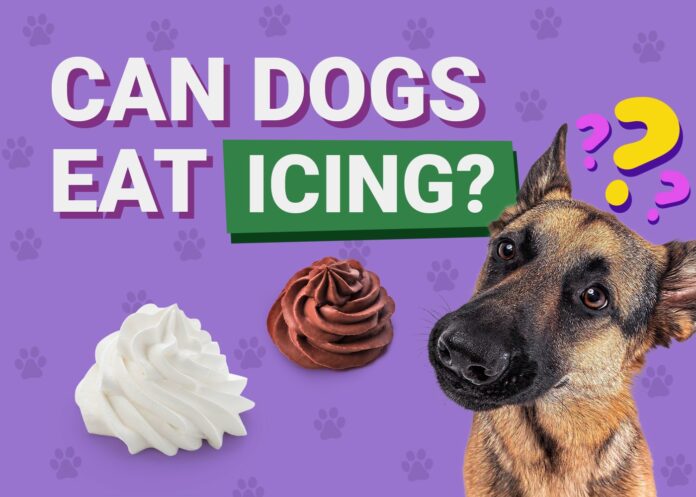
Dogs and sweet treats – it’s a combo that makes many pet parents wonder about safety. If you’ve ever caught your pup eyeing that leftover birthday cake or wondered “can dogs eat icing,” you’re not alone. Let’s dive into everything you need to know about dogs and icing.
The Quick Answer
No, dogs should not eat icing. While a tiny lick might not cause immediate harm, icing contains ingredients that can be harmful to your furry friend’s health. If you’re looking for more information about dog nutrition and safe treats, check out our comprehensive guide about dogs.
Why Icing is Bad for Dogs
Sugar Content
The primary concern with icing is its high sugar content. Dogs’ digestive systems aren’t designed to process large amounts of refined sugars. When dogs eat icing they might experience
- Dental problems
- Weight gain
- Diabetes risk
- Upset stomach
- Hyperactivity followed by energy crashes
Artificial Ingredients
Most icings contain artificial sweeteners, colors, and preservatives that can be toxic to dogs. Xylitol, a common sugar substitute, is particularly dangerous and can cause:
- Liver failure
- Low blood sugar
- Seizures
- In severe cases, death
Types of Icing and Their Risks
Buttercream Frosting
This popular icing type is basically butter mixed with powdered sugar and flavorings. While not immediately toxic, it’s super rich and can cause:- Pancreatitis- Severe digestive upset- Diarrhea- Vomiting
Royal Icing
Made with egg whites and sugar royal icing poses additional risks – Raw egg concerns- Higher sugar concentration- Potential food coloring toxicity
Cream Cheese Frosting
While cream cheese itself isn’t toxic, the high fat and sugar content can be problematic:- Digestive issues- Lactose intolerance reactions- Potential pancreatitis
What to Do if Your Dog Eats Icing
If your furry friend has managed to sneak some icing, don’t panic! Here’s what you should do:
- Assess the amount eaten
- Check the ingredients list
- Monitor for symptoms
- Contact your vet if concerned
As Pet like boss always recommends, it’s better to be safe than sorry when it comes to your pet’s health.
Safe Alternatives to Icing
Instead of letting your dog eat icing, try these pet-friendly alternatives:
- Plain yogurt (in moderation)
- Pumpkin puree
- Mashed banana
- Sugar-free applesauce
- Commercial dog-safe treats
Long-term Health Impacts
Regular consumption of icing or sugary treats can lead to:
- Obesity
- Dental disease
- Diabetes
- Heart problems
- Joint issues
Prevention Tips
Keep these tips in mind to prevent your dog from accessing icing:
- Store cakes and treats out of reach
- Clean up spills immediately
- Inform guests not to share desserts
- Keep trash secured
- Use dog-proof containers
Making Special Occasions Safe
Want to include your pup in celebrations? Here are some ideas:
- Make dog-friendly “pupcakes”
- Use pet-safe toppings
- Create frozen yogurt treats
- Buy specialized dog birthday cakes
- Make vegetable-based treats
Common Myths About Dogs and Sweets
Let’s bust some common misconceptions:
Myth 1: A little bit won’t hurt
While small amounts might not cause immediate problems, even tiny portions can encourage bad habits and lead to health issues.
Myth 2: My dog has eaten it before and was fine
Just because your dog survived one encounter doesn’t mean it’s safe. Each exposure risks complications.
Myth 3: Natural sugar is okay
Even natural sugars should be limited in your dog’s diet.
Signs of Sugar Toxicity in Dogs
Watch for these symptoms after your dog eats icing:
- Vomiting
- Diarrhea
- Lethargy
- Excessive thirst
- Unusual behavior
- Loss of appetite
Training Tips
To prevent your dog from begging for sweets:
- Establish clear boundaries
- Use positive reinforcement
- Provide healthy alternatives
- Be consistent with rules
- Train the “leave it” command
Final Thoughts
Can dogs eat icing? The answer remains no. While the occasional tiny taste might not be immediately dangerous, it’s best to avoid giving your dog icing altogether. Instead, focus on providing healthy, dog-appropriate treats that will keep your furry friend happy and healthy.
Remember, every dog is different, and what might cause mild discomfort in one could be dangerous for another. When in doubt, always consult with your veterinarian about your pet’s specific dietary needs and restrictions.
By following these guidelines and choosing appropriate alternatives, you can ensure your dog stays healthy while still feeling included in special occasions. After all, showing love to our pets doesn’t have to involve sharing our sugary treats – there are plenty of safer ways to spoil them!










![Why Do Dogs Lick Legs After Shower? The Weird But Adorable Behavior Explained [Help] Why does my dog lick me when I get out of the shower?](https://petlikeboss.com/wp-content/uploads/2024/11/dog-lick-legs-100x70.jpg)
